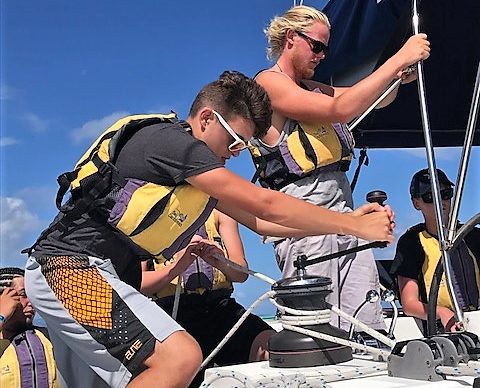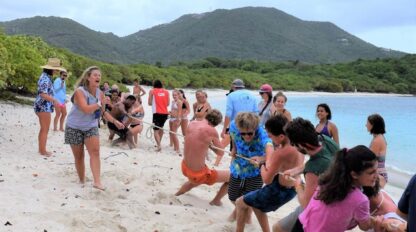Yo Ho, Yo Ho, A Pirate’s Life For Me


We’re all familiar with “yo ho, yo ho, a pirate’s life for me.” But, before Johnny Depp and the cast of Pirates of the Caribbean popularized that infamous line, where did these sea shanties and songs originate from? We’ve done our homework, so you don’t have to.
What is a sea shanty (or chanty)?
A sea shanty is a working song (a cappella, without instruments) that would be sung during manual labor performed on a vessel. The shanties would be created so that the tempo matched the speed of the work being done. The songs are generally sung by a single voice with the remainder of the “pirates” singing the chorus. Consider the Macarena, for those of you old enough to know it, where the cadence of the song matches the rhythm of each and every dance movement perfectly.
When did sea shanties originate?
Shanties began as work shouts or “sing-outs.” They would be used to coordinate work executed by each crew member of the boat. Unfortunately, there is not enough research to pinpoint exactly when sailors began using work shouts or sing-outs. In 1920, we learned of the first full-length sea shanty “Cheer’ly Man.”
Oh Sally Racket hi-ho cheer’ly man, pawned me best jacket hiho cheer’ly man and sold me ticket hi-ho, cheer’ly man o haulee hi-ho cheer’ly man
Oh Nancy Dawson hi-ho cheer’ly man she’s got a notion hi-hi cheer’ly man for our old bosun hi-ho cheer’ly man o haulee hi-ho cheer’ly man
Oh Betsy Baker hi-ho cheer’ly man lived in long acre hi-ho cheer’ly man married a quaker hi-ho cheer’ly man oh haulee hi-ho cheer’ly man
Oh Kitty Carson hi-ho cheer’ly man jilted the parson hi-hi cheer’ly man married a mason hi-ho cheer’ly man oh haulee hi-ho cheer’ly man
Avast there Avast hi-ho cheer’ly man make the fall fast hi-hi cheer’ly man make it well fast hi-ho cheer’ly man o haulee hi-ho cheer’ly man
Oh Nancy Riddle hi-ho cheer’ly man she broke her fiddle hi-hi cheer’ly man just in the middle hi-ho cheer’ly man oh haulee hi-ho cheer’ly man
Though not a song like those we know today, it was a popular song among merchant marines. In time, these songs began to phase out.
Where did these songs come from?
It’s rumored that many of these melodies received their origin from African-American work songs. Such songs were foreign to Euro-Americans prior to the African-Americans arrival in the New World. These songs once again mirrored each and every movement the group would make, keeping time with the music. It was these songs that Euro-Americans transferred to merchant ships often using the same lyrics and rhythm. Later, the songs would be morphed into sail specific anthems.
But, how did Euro-Americans learn these songs?
During the cotton trade (~1451-1880), many sailors from Britain and Ireland would seek refuge from the winter seas. They would go ashore in search of high-paying jobs in the way of cotton-screwing. This task was not easy as it took many men to complete the work. Cotton-screwing entails compressing cotton and forcing bales into holds of ships leaving the port. It was during these times that the groups began exchanging songs to help the work days not only go faster, but to help make daily tasks easier or more enjoyable.
Where have the sea shanties gone?
By the mid-1900s, more and more machines were used to complete jobs thus signaling the demise of sea shanties. However, you can still stumble upon sea shanties of various constructions in many modern places. For example, the video game Assassin’s Creed IV – Black Flag features the above song “Cheer’ly Man” within the game. Additionally, searching YouTube for sea shanties brings up hundreds of results. So, next time you’re raising or lowering the mainsail or anchor, take a lesson from a true pirate and burst out in your favorite sea shanty with the rest of your crew!

